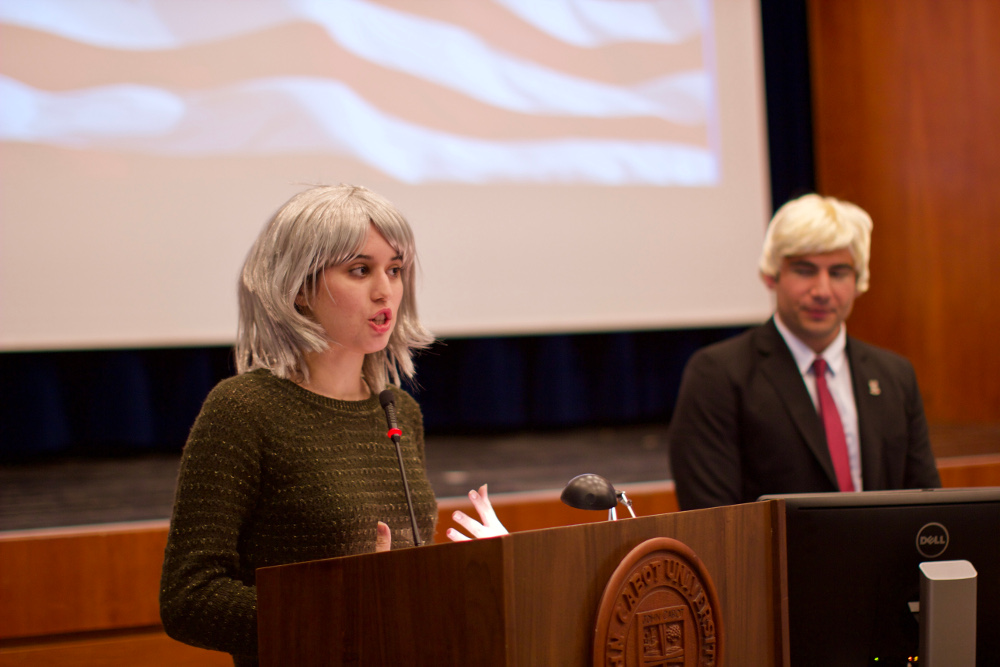Grassroots, Business Club and Student Government Present "7 Shades of Green" Conference
On Tuesday, April 18, 2017, John Cabot University’s Student Government, together with Grassroots and the Business Club hosted the conference “7 Shades of Green.” Speakers from seven student clubs spoke about environmentalism, climate change and green economy. In addition to the three organizers, the participating clubs were: the Art History Club, the International Relations Society, the Chinese Club, the Fashion Club, and Speak Up.
Gentian Limani, President of the Business Club, opened the conference by talking about the incredible growth green business has seen in recent years. He spoke of Elon Musk and his companies, specifically Tesla, an electric car company that has recently become the largest car manufacturer in the US. Gentian also discussed the growth of the renewable energies business, from solar to wind power. In conclusion, “now is the time to invest in green business,” he said.
Madison King from the Art History Club spoke next, describing artists and architects who have made an impact on environmentalism, or whose installations are closely linked to the environment. She described the works of Robert Smithson, Jeff Hong, Marina Debris, Sandhi Schimmel Gold, and the buildings designed by the Oppenheim Architecture + Design studio and Renzo Piano. “Art makes a statement, and art can drive change,” said Madison.
Mihail Yotov, who represented the IR Society, tackled the issue of green politics, which he defined as a doctrine that “aims to create an ecologically sustainable society rooted in environmentalism, non-violence, social justice and grassroots democracy.” He defined sustainable development as “development that meets the needs of the present without compromising the future,” and explored the three pillars of green politics: economic development, social development, and environmental protection.
Filippo Nicoletti from the Chinese Culture Club described how China is becoming greener. He talked about the effort to increase awareness of environmental issues in the population, especially in young people. He also spoke of new initiatives to reduce pollution, such as the deployment of 5600 environmental inspectors. Finally, Filippo said that, thanks to a long-standing effort, the Giant Panda has been officially removed from the list of endangered species.
Next up was Jan-Michael Putter of the Fashion Club. He described how the textile and clothing industry is the second one in terms of impact on the environment. He then spoke of Swedish clothing-retail company H&M as an example of a green business. In fact, H&M committed to reach 100% renewable energy in all operations, to lower CO2 emission by 47% and to produce all their gear with recycled or sustainable materials by 2030. Jan-Michael concluded by giving advice on how to save energy. “Wash your clothes less frequently, wash them at 30 degrees instead of 40 and you will save 60% energy. In addition, your clothes will last longer,” he said.
Speak Up closed the conference. The club’s president, Monica Lungeanu, spoke of green (or sustainable) design. She explained the need to use recycled materials in the production of goods, especially furniture and art, and illustrated the growth of the “do it yourself” movement. Later, VP Giovanni Raguso and Secretary Nastassja Biles presented a comedy sketch where they interpreted President Donald Trump and Hillary Clinton advocating their respective positions on environmental issues. The sketch was meant to convey the need for grassroots political action on environmental issues, considering the often empty rhetoric of politicians, said Biles.
To conclude the event, club presidents signed a “Presidential Environmental Pledge,” in an attempt to reach a greater involvement on environmental issues, starting now and moving into the future.








